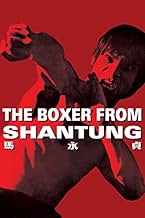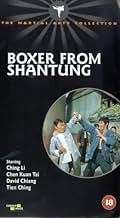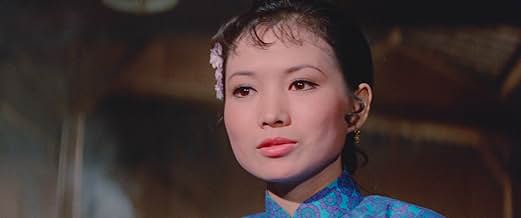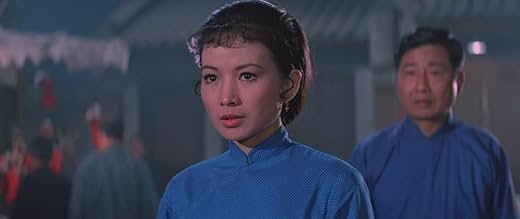NOTE IMDb
7,0/10
1,7 k
MA NOTE
Quittant la pauvreté de sa vie à Shantung pour chercher fortune à Shanghai, le Boxeur est entraîné dans un monde de corruption, de guerre des gangs et de malveillance, où sa seule protection... Tout lireQuittant la pauvreté de sa vie à Shantung pour chercher fortune à Shanghai, le Boxeur est entraîné dans un monde de corruption, de guerre des gangs et de malveillance, où sa seule protection est sa fameuse technique de combat.Quittant la pauvreté de sa vie à Shantung pour chercher fortune à Shanghai, le Boxeur est entraîné dans un monde de corruption, de guerre des gangs et de malveillance, où sa seule protection est sa fameuse technique de combat.
- Réalisation
- Scénario
- Casting principal
Chen Kuan-Tai
- Ma Yong Zhen
- (as Kuan Tai Chen)
Mario Milano
- Russian Boxer
- (as Ma Lan Nu)
Ku Feng
- Chang Chin Fa - Champion 2
- (as Feng Ku)
Chiang Nan
- Boss Yang Shuang
- (as Nan Chiang)
Avis à la une
'Ma yong zhen' or 'Boxer from Shantung' in the dubbed videocassette version I viewed is a long film but engrossing, showing the rise of Ma Yung Chen from lowly labourer to gang boss.
The film has a strange melancholy air, ending with some of the characters fleeing from Shanghai as war approaches. The music has also a sad feel to it. Avarice is the main driving force of most of the characters as they go about their business but over all there is a doomed air.
Kuan Tai Chen who plays Ma Yung Chen (very well) has a pleasant appealing smile but there is something sad in him too. His yearning to be somebody is touching. He is plausible in the fight scenes too, particularly the tremendous gory fight at the end, which seems to go on endlessly like a nightmare you can't wake up from. David Chiang as usual is great, though not on the screen long enough. The 'four champions' in the film include the Shaw Brothers regular Feng Ku who is always good value.
I believe John Woo worked as an assistant director on the film and is a fan of the director, Cheh Chang. Compare the end of this film with the end of Woo's 'The Killer'.
There is a lot of combat in this film but it sits well with the narrative and the characters. Some martial art films are all fighting and no plot but 'Boxer from Shantung' has both in equally good measures.
The film has a strange melancholy air, ending with some of the characters fleeing from Shanghai as war approaches. The music has also a sad feel to it. Avarice is the main driving force of most of the characters as they go about their business but over all there is a doomed air.
Kuan Tai Chen who plays Ma Yung Chen (very well) has a pleasant appealing smile but there is something sad in him too. His yearning to be somebody is touching. He is plausible in the fight scenes too, particularly the tremendous gory fight at the end, which seems to go on endlessly like a nightmare you can't wake up from. David Chiang as usual is great, though not on the screen long enough. The 'four champions' in the film include the Shaw Brothers regular Feng Ku who is always good value.
I believe John Woo worked as an assistant director on the film and is a fan of the director, Cheh Chang. Compare the end of this film with the end of Woo's 'The Killer'.
There is a lot of combat in this film but it sits well with the narrative and the characters. Some martial art films are all fighting and no plot but 'Boxer from Shantung' has both in equally good measures.
Before the advent of DVD media, films such as Cheng Cheh's "Boxer From Shantung" could only be seen in severely butchered form, complete with laughable and awful dubbing, fair to poor picture quality, always in "pan and scan" format with a percentage of the picture chopped out, and in most cases, with the harder violence removed as well. Finally "Ma Yong Zhen" can be seen the way director Cheh envisioned his passionate "rags to riches" epic, with "epic" being a suitable word as this film is quite big in scope, and surpasses the 2 hour mark. The tale itself is a familiar one to be sure; a young, ambitious street urchin uses his unique boxing skills and mental cunning to climb the bloody ladder of success, and fortune. But this tale has rarely been filmed so eloquently. There is so much to praise here, beginning with cinematography; forget comparing this film with the endless and uninspired kung-fu pictures made through the 60's to 70's. For the look of "Ma Yong Zhen" is that of a mostly beautiful art-house style production. This can finally be seen in it's original aspect ratio of 2,35 widescreen, and the difference is hardly describable. For years apparently, this was only released widely with a running time of just over 90 minutes, but the wonderful DVD from "Celestial Pictures" restores the feature to it's 124 minute running time. The lead character, played by Chen Kuan-tai, is really superb in his role as the ambitious 'Ma'. He possesses a strange, utterly unique physical beauty which somehow elicits sympathy from the viewer. The film reminded me a bit of 1983's "Scarface", as the stories, as well as the extreme violence are similar themes within both pictures. However Chen's character never loses touch with his own humanity, unlike Tony Montana, who became a monster. And I must agree with another poster who described the feeling of "sadness" that envelops the film. Much of it is quiet, subdued, featuring some haunting, and totally unobtrusive musical score. Of course this is misleading, as the film explodes with a brand of violence hard to describe, for the films breathtaking climax. That new DVD also features the original Mandarin language audio track, and hearing the original language is the only way to see this. There are English subtitles as well. Recommended viewing for anyone curious to see a how a traditional kung-fu film can be transformed into a work of art.
BOXER FROM SHANTUNG (aka KILLER FROM SHANTUNG, 1972) successfully combines gangster and kung fu genres to create a compelling two-hour rags-to-riches tale of a poor drifter in early 20th century Shanghai who rises up in the local mob by virtue of his kung fu skills. Ma Yung Chen (played by Chen Kuan-Tai) so impresses the local bosses that he is quickly given his own teahouse and protection racket, yet he remains loyal to his friends, including a hapless little sidekick, and friendly to the poor. He has a run-in with another local gangster, Tan (David Chiang in an extended cameo), but they soon develop mutual respect.
The kung fu comes in when Ma is confronted by rival gangster Yang, whose henchmen consist of the Four Champions. When Ma beats three of the Champions in their very first encounter, an enmity develops that finally culminates in a massive brawl at a neutral teahouse where Ma takes on dozens of Yang's thugs. In this remarkable fight scene, Ma is hit with an ax but continues to fight up and down the two stories of the building with the ax imbedded in his stomach. It's all shot in the Shaw Bros. studio and backlot in Hong Kong, with some additional work on HK locations familiar to kung fu fans.
Chen Kuan-Tai (EXECUTIONERS FROM SHAOLIN) was bigger and stronger-looking than most Shaw Bros. kung fu stars and carries the right air of brute force and intimidation in what is essentially the role of a petty gangster. Yet his broad smile, outgoing manner and protective nature give his rough-hewn character a likability that attracts audience sympathy. Ma is not just a standard vengeance-seeking kung fu student forced to learn new styles to beat a more powerful opponent. He is more at loose ends, trying to find his way in the world and not necessarily on the straight and narrow path.
Aside from Chen and David Chiang, the few familiar kung fu faces in the cast include Cheng Kay Yeh (as Chen's sidekick), Ku Feng (as one of the champions) and Wang Ching. Top-billed actress Ching Li co-stars as Chen's love interest, a singer in the restaurant he runs, although her role is less significant than the billing would indicate. The film was directed by kung fu specialist Chang Cheh, with Pao Hsueh Li given a co-directing credit. The action directors are an impressive lot and include Tang Chia, Liu Chia Liang (Lau Kar Leung), and Liu Chia Yung.
ADDENDUM: A follow-up of sorts is the similarly-styled MAN OF IRON (1972), also reviewed on this site, which also co-stars Chen Kuan Tai and Ching Li, but gives Ms. Ching a larger, more interesting role. QUEEN BOXER (1974), also reviewed on this site, is an unofficial non-Shaw sequel to SHANTUNG and focuses on the sister of Ma Yung Chen as she arrives in Shanghai and begins a quest for vengeance. She is played by the phenomenal kung fu diva, Chia Ling (billed as Judy Lee).
In December 2003, Celestial/IVL released a restored, remastered, letter-boxed, subtitled Region 3 DVD of BOXER FROM SHANTUNG. That's the one to see.
The kung fu comes in when Ma is confronted by rival gangster Yang, whose henchmen consist of the Four Champions. When Ma beats three of the Champions in their very first encounter, an enmity develops that finally culminates in a massive brawl at a neutral teahouse where Ma takes on dozens of Yang's thugs. In this remarkable fight scene, Ma is hit with an ax but continues to fight up and down the two stories of the building with the ax imbedded in his stomach. It's all shot in the Shaw Bros. studio and backlot in Hong Kong, with some additional work on HK locations familiar to kung fu fans.
Chen Kuan-Tai (EXECUTIONERS FROM SHAOLIN) was bigger and stronger-looking than most Shaw Bros. kung fu stars and carries the right air of brute force and intimidation in what is essentially the role of a petty gangster. Yet his broad smile, outgoing manner and protective nature give his rough-hewn character a likability that attracts audience sympathy. Ma is not just a standard vengeance-seeking kung fu student forced to learn new styles to beat a more powerful opponent. He is more at loose ends, trying to find his way in the world and not necessarily on the straight and narrow path.
Aside from Chen and David Chiang, the few familiar kung fu faces in the cast include Cheng Kay Yeh (as Chen's sidekick), Ku Feng (as one of the champions) and Wang Ching. Top-billed actress Ching Li co-stars as Chen's love interest, a singer in the restaurant he runs, although her role is less significant than the billing would indicate. The film was directed by kung fu specialist Chang Cheh, with Pao Hsueh Li given a co-directing credit. The action directors are an impressive lot and include Tang Chia, Liu Chia Liang (Lau Kar Leung), and Liu Chia Yung.
ADDENDUM: A follow-up of sorts is the similarly-styled MAN OF IRON (1972), also reviewed on this site, which also co-stars Chen Kuan Tai and Ching Li, but gives Ms. Ching a larger, more interesting role. QUEEN BOXER (1974), also reviewed on this site, is an unofficial non-Shaw sequel to SHANTUNG and focuses on the sister of Ma Yung Chen as she arrives in Shanghai and begins a quest for vengeance. She is played by the phenomenal kung fu diva, Chia Ling (billed as Judy Lee).
In December 2003, Celestial/IVL released a restored, remastered, letter-boxed, subtitled Region 3 DVD of BOXER FROM SHANTUNG. That's the one to see.
No pun intended - you have to give it to our main character. He seems to be able to fight anyone ... and get away with it. Nothing really new of course when it comes to movies like this. Also the people waiting their turn to get ... well what's coming for and to them.
That all being said, our main character is quite ... how do I put it? He thinks very highly of himself - I guess you could say he has reason to, seeing how he fights. He is not the only one to think so - and his heart is in the right place after all. Still could it be he might bite more off than he can chew? The final climax will be the one to see ... of course all fights before that are well choreographed too.
There's also a lot of red paint here - well some call it Ketchup, but it does look more like paint to me. And it is another stable factor in movies like this, especially from that era. Although way more than I remember seeing back when I was little. Maybe they were cut in Germany when I watched them. The ending may be a bit too long too - it could have done with some trimming ... and the drama is ... well almost too much. There are others movies that are attached to the main character here - though I have no idea if they are supposed to be spin offs, prequels or sequels or just reimagination ... maybe something completely different? Won't be able to watch any of them any time soon for sure ...
That all being said, our main character is quite ... how do I put it? He thinks very highly of himself - I guess you could say he has reason to, seeing how he fights. He is not the only one to think so - and his heart is in the right place after all. Still could it be he might bite more off than he can chew? The final climax will be the one to see ... of course all fights before that are well choreographed too.
There's also a lot of red paint here - well some call it Ketchup, but it does look more like paint to me. And it is another stable factor in movies like this, especially from that era. Although way more than I remember seeing back when I was little. Maybe they were cut in Germany when I watched them. The ending may be a bit too long too - it could have done with some trimming ... and the drama is ... well almost too much. There are others movies that are attached to the main character here - though I have no idea if they are supposed to be spin offs, prequels or sequels or just reimagination ... maybe something completely different? Won't be able to watch any of them any time soon for sure ...
Occasionally too gluey Eastern about the rising of Ma Yongzhen [ Chen Kuan Tai, in the German title he's giving a pirate, not a boxer ] , who hast to recognize later, the air up there is quite thin. The formal data's of the movie are quite impressing: John Woo as assistant director, Chen Kuan Tai became one the Top Actors thru it, it's with KING BOXER and FIST OF FURY one of THE influential movies of the time, followed by a somehow sequel [ IRON MAN ] and a remake [ Corey Yuen Kwai's HERO, with Takeshi Kaneshiro and the then-comeback of Yuen Biao ].
An epic is aimed, the premise is well, but due to the missing pace and the lacking dramatic and elaboration it isn't reached. The action scenes are either rigid or way too exaggerated, and some sequences could have been cut; a running time of 2hrs is too much for that. For example the Wrestling episode, which is terribly long, but also some sections with Ching Li as eye-catcher and secret love interest of Ma Yongzhen, which adds nothing at all to the film. So there's only struggle to the next, the opponents are always increasing, Ma himself is little impressed by that. At the end he runs around a tea house, collapsing it and beating the sh*t out of estimated 200 thugs, and already has an Axe cut in his belly. Thats too silly.
Movie has sure his strengths, production values is as high as the body count, Chen Kuan Tai does very well in his first leading role, there's an expanded cameo of David Chiang and the gangster story is something new, compared to the usual revenge - plot. The prologue and epilogue are quite fine, between them is a good film, but not an outstanding one.
An epic is aimed, the premise is well, but due to the missing pace and the lacking dramatic and elaboration it isn't reached. The action scenes are either rigid or way too exaggerated, and some sequences could have been cut; a running time of 2hrs is too much for that. For example the Wrestling episode, which is terribly long, but also some sections with Ching Li as eye-catcher and secret love interest of Ma Yongzhen, which adds nothing at all to the film. So there's only struggle to the next, the opponents are always increasing, Ma himself is little impressed by that. At the end he runs around a tea house, collapsing it and beating the sh*t out of estimated 200 thugs, and already has an Axe cut in his belly. Thats too silly.
Movie has sure his strengths, production values is as high as the body count, Chen Kuan Tai does very well in his first leading role, there's an expanded cameo of David Chiang and the gangster story is something new, compared to the usual revenge - plot. The prologue and epilogue are quite fine, between them is a good film, but not an outstanding one.
Le saviez-vous
- AnecdotesAccording to Chen Kuan-Tai, most of the Shaw Brothers films took roughly two months to work on, but due to a tight schedule this had to be shot in one month. With this cramped schedule, director Cheh Chang was only able to direct during the night shoots, while uncredited director Hsueh-Li Pao directed during the day shoots.
- GaffesWhen the boss is dropped off to fight, overhead power lines are visible behind the driver.
- Versions alternativesThe Arrow Films "Shaw Scope Vol. 1" release of the film is the complete and uncut 134 min version of the film. Previous Celestial Pictures restorations were 130 min due to frame cuts (a practice that was criticized in the earlier Shaw Brothers restorations.)
- ConnexionsFeatured in Cinema Hong Kong: Kung Fu (2003)
Meilleurs choix
Connectez-vous pour évaluer et suivre la liste de favoris afin de recevoir des recommandations personnalisées
- How long is The Boxer from Shantung?Alimenté par Alexa
Détails
- Date de sortie
- Pays d’origine
- Langue
- Aussi connu sous le nom de
- Le Justicier de Shanghaï
- Société de production
- Voir plus de crédits d'entreprise sur IMDbPro
- Durée2 heures 14 minutes
- Mixage
- Rapport de forme
- 2.35 : 1
Contribuer à cette page
Suggérer une modification ou ajouter du contenu manquant

Lacune principale
By what name was La Brute, le Bonze et le Méchant (1972) officially released in India in English?
Répondre
































